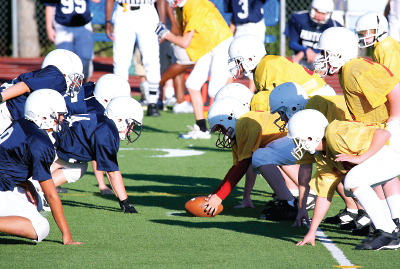Early Exposure to Football May Have Long-Term Behavioral Consequences
Abstract
People who started playing football before age 12 have about twice the risk of developing symptoms of apathy and depression relative to those with similar-length careers who started playing later.
A neuropsychiatric assessment of former football players has found that those who began playing the sport before the age of 12 were more likely to report symptoms of depression and apathy as adults than those who started playing after they turned 12. This association was independent of the players’ current age, duration of football play, or history of learning disabilities.

The findings suggest that “[i]f you have two people who played football for the same number of years and took around the same number of hits, one of whom started at age 12 and the other at age 17, the player starting at 12 would have a greater risk of behavioral problems,” Yorghos Tripodis, Ph.D., an associate professor of biostatistics at the Boston University School of Public Health, told Psychiatric News. Tripodis, a member of the BU Alzheimer’s Disease and Chronic Traumatic Encephalopathy Center (CTE), co-led the study, which was published September 19 in Translational Psychiatry.
Previous research has established a connection between an earlier start to football and greater risk of later psychiatric disorders, cognitive problems, and the neurodegenerative disorder CTE. While these studies were predominantly carried out in former professional football players who had long careers, the study by Tripodis and colleagues included many amateur players who stopped playing after high school or college. The findings seem to show that even a brief career during youth might have a long-lasting impact.
The researchers analyzed data from 214 former amateur and professional football players who were part of an ongoing study called the Longitudinal Examination to Gather Evidence of Neurodegenerative Disease (LEGEND). As part of LEGEND, these former players (average age: 50 years) took a series of annual cognitive and mood tests, including the Brief Test of Adult Cognition by Telephone (BTACT), Behavior Rating Inventory of Executive Functio–Adult Version, Center for Epidemiologic Studies Depression Scale, and the Apathy Evaluation Scale.
Study Points to Possible Biomarker for CTE
While the study of former players reported above did not directly involve CTE, Tripodis and his colleagues at the BU Alzheimer’s and CTE Center recently made an important advance in relation to this mysterious neurodegenerative disease. By comparing brain tissue samples from deceased football players with CTE with samples from Alzheimer’s patients and healthy controls, they identified a potential CTE biomarker: the protein CCL11.
This protein was elevated in the CTE but not Alzheimer’s samples, and the amount of CCL11 present correlated with the number of years of football played. CCL11 was also present in cerebrospinal fluid (CSF) samples, and the authors suggested that measuring CCL11 in CSF might be used to help diagnose CTE. However, they also cautioned that this is a very preliminary analysis that assessed a select group of donated brains.
The results were published September 26 in the journal PLoS One at http://journals.plos.org/plosone/article?id=10.1371/journal.pone.0185541.
When the investigators divided the group based on age of first exposure (AFE) to football, they found that players who began playing before age 12 had about twice the odds of having worse scores on their executive function and apathy tests, and three times the odds of elevated scores for depressive symptoms.
Tripodis told Psychiatric News that 12 was chosen as the cut-off since the current literature points to the ages of 10 to 12 as a critical time in the maturation of the male brain; significant new neural connections are made during this time, especially to and from regions involved in emotional regulation.
Early exposure to football play “is an important risk factor, but it’s not the only one,” Tripodis said. “The number of cumulative blows you receive is also a problem, so there are risks for behavioral problems no matter when you start.”
By the same measure, many of the participants who played football at young ages had normal test scores, so early exposure does not guarantee anything.
Interestingly, there were no significant effects of AFE on cognition as measured with BTACT. This was unexpected, as a study from BU investigators in 2015 suggested that early football exposure was linked with memory problems in older professional players. Tripodis speculated that the BTACT—which is a short and simple telephone interview—may not be comprehensive enough to capture subtle cognitive problems. This is an area that needs further exploration, he said.
Tripodis also cautioned that while this work involved football players and was carried out by the BU CTE Center, it does not make any conclusions or connections about age of first exposure to football play and CTE.
“CTE can be diagnosed only after death, and though many symptoms displayed by the players we interviewed are associated with CTE, they are also associated with other disorders,” he said.
This study was supported by multiple grants from the National Institutes of Health as well as funding from the Concussion Legacy Foundation. ■
“Age of First Exposure to American Football and Long-Term Neuropsychiatric and Cognitive Outcomes” can be accessed here.



